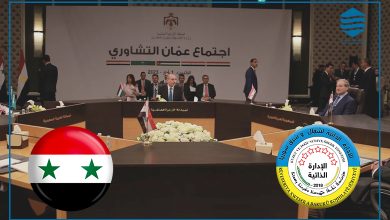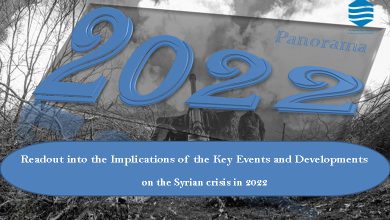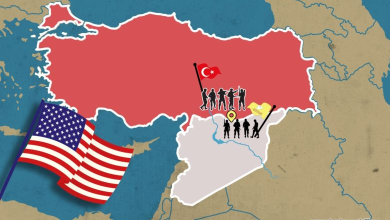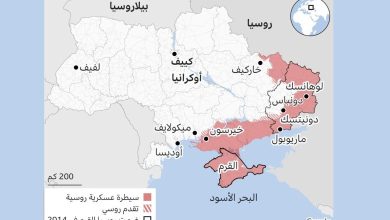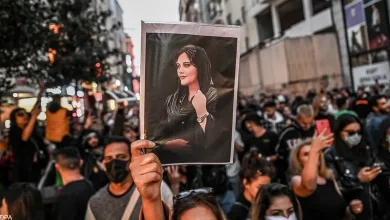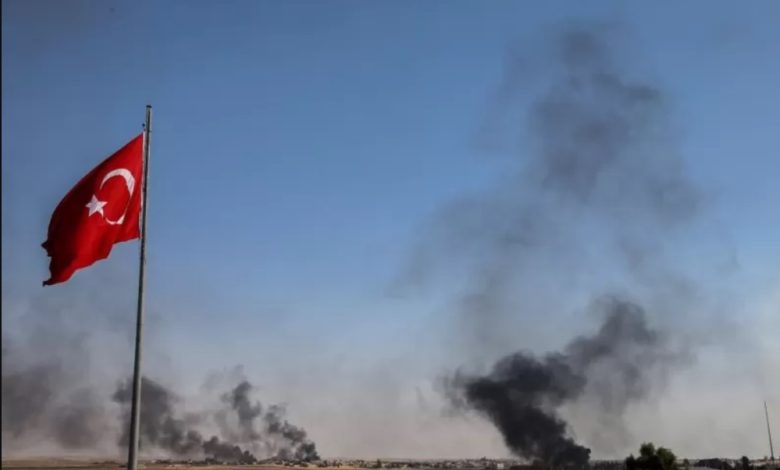
Turkish Policy’s Blunder in Syria… Shifting from Antagonism to Reconciliation
Dr. Abdel-Ilah Al-Mustafa: A researcher at Al- Furat Center for Studies
Translation Department
The Turkish President announced his intention to hold a new summit with Russian President Vladimir Putin, which was held on the fifth of August, just a few days after holding the Tehran summit that brought together Raisi, Putin, and Erdogan, on 19 July. It seems that the summit was aiming at completing work on what was agreed upon at the Tehran summit, on the issue of the possibility of normalization with the Syrian regime, and the search for alternatives and tools to confront the Autonomous Administration of North and East of Syria (AANES), after Iran and Russia rejected the Turkish quest to launch a military operation in the regions of north and east Syria. Erdogan had to make more concessions to obtain approval to launch this process, or find alternatives that could preserve “Turkey’s national security,” and the accelerating events have revealed the extent of these concessions.
The result did not live up to the size of the concessions made by Ankara after the Sochi summit. Some understandings were reached, which would contribute to dispelling Turkey’s concerns about its “national security,” such as talking about the Adana Agreement/2/ and coordinating between the two countries in fighting all kinds of terrorism. Terrorist organizations, and push the political process forward, in order to reach a lasting solution in Syria. Whereas, the concessions consisted in descending to the level of accepting reconciliation (normalization) with the regime in Damascus, after all the manifestations of hostility shown by the Justice and Development government over the course of eleven years, and then searching for a way to reconcile between the Syrian regime and opposition.
It seems that Syria and its crisis, with the exception of the Kurdish areas, are turning into a small detail, after the expansion of strategic interests between Ankara and Moscow, their shared littoral of the Black Sea, the Turkish nuclear reactor project, arms deals, Russian gas pipelines to Europe, the volume of trade exchange, transportation, and contracting and Turkey’s being the tourist destination for many Russians and others, pushes it to gamble with its new friends (the Syrian opposition), the old ones (the West), and its allies (NATO) to maintain its new relations with Russia. While the Kurdish regions are the basis for shaping the major strategies and the actual directions of the Justice and Development government, and they have become the main engine and motive in all of Turkey’s regional and international actions.
The Turkish-Russian negotiations did not pay attention to the presence of other active forces in Syria and its crisis, and ignored their existence, and proceeded in the footsteps of the “Astana’s” and the search for solutions in isolation from the international powers and the United Nations and its decisions to solve the Syrian dilemma. It ignored the presence of the international coalition, led by Washington, which sets its goals in Syria in fighting ISIS, searching for political solutions to the Syrian crisis, and confronting Iran. Rather, Erdogan, at the most likely request of Tehran and Moscow, demanded that the United States withdraw from the Euphrates’ eastern areas in Syria, after the conclusion of the Tehran summit.
Turkey had no need to plunge itself into the Syrian crisis, and even in all the crises of the “Arab Spring.” The issue is simply that the Justice and Development government refreshed its hopes of reviving the Turkish imagination about restoring “Ottoman glories” or obtaining the areas of the “Milli Charter” at the least, but it has achieved, so far, nothing but the collapse of its economic situation, heavy diplomatic losses in the region, and further distancing from its allies in the Western camp. While the subject of its survival in NATO has become a subject of discussion at the internal level in Turkey, and at the level of some active member states of NATO, following its stance on the Russian-Ukrainian war, and Erdogan’s sitting with Putin, as the first NATO president to take this step, in the midst of the tension between Moscow and the alliance. Moreover, its relationship with Russia in general since Russia’s S-400 purchase deals.
The new Turkish pivot and dangerous U-Turn
The new Turkish policy is linked to the development of external and internal files. The external files are the clear transformation in relations between Ankara and Moscow on one hand, and Ankara and Tehran on the other hand. It is a new adventure for the Justice and Development government, at the expense of Ankara’s strategic relations with the West (European Union and NATO).
As for the internal files, they are directly related to the upcoming presidential elections in Turkey, which will determine the fate of the Justice and Development Party and its president, Recep Tayyip Erdogan; In addition to another important file, which is the file of Syrian refugees.
The Turkish pivots are not limited to the Syrian issue only. The history of Erdogan’s pivots at the international level is well known, and the earliest and most recent are the regional pivots that took place during the recent period, which are:
- The shift of position towards Tel Aviv happened after Erdogan congratulated Israeli President Isaac Herzog in July 2021 in a phone call for his victory in the presidential elections and then invited him to visit Ankara (the visit took place last March), after a decade of tension between the two countries, after the killing of A number of Turks in the incident of the “Mavi Marmara” ship in 2014.
- Erdogan closed the file of Jamal Al-Qashoggi overnight, after he used it as Othman’s shirt against the Kingdom of Saudi Arabia, for an enough period, and visited it in late April of this year.
- Abandoning the Egyptian Muslim Brotherhood, and cracking down on them in Turkey in order to improve relations with Cairo,” there is nothing to prevent relations with Egypt from advancing to a high level,” Erdogan said in a statement last July.
- Returning to the arms of Abu Dhabi, after all of Al Gargash’s statements and insults to Turkey, following the dispute with it in the Libyan crisis, then the Qatar crisis.
Concerning the latest pivot, which was not surprising to many, which only shocked the opposition supporters and its armed factions, was its intention to open a new page with the Syrian regime, on the principle of “God forgives the past,” which will leave a scar that cannot be easily repaired in the relations of those people with the Turkish government, except to satisfy some of the sick people of them, by bombing the Autonomous Administration’s areas, such as the ones carried out by the Turkish forces on the border strip in the past few days, or they may be satisfied only by circulating about a new Turkish “military operation” in north and east of Syria on the media.
Have Turkish-Syrian relations really been cut?
It is no secret that the intelligence relations between Damascus and Ankara have never been interrupted throughout the Syrian crisis, but the Syrian opposition believes that these relations are only directed against the Kurds, the(AANES) and the Syrian Democratic Forces(SDF), and they have been intoxicated by the tenderness of the Justice and Development government and its dollars, and perhaps blinded them that they are targeted with at the same time and even more, and the tragic fate of poor Hussein Harmoush and others is only the result of those relations. Moreover, we should not forget that the consular relations between the two countries have not been completely cut, and this is also a dangerous indicator, but the Syrian opposition ignored the fact that this was one of the parameters of the Turkish recognition of the Syrian regime, in contrast to the speeches of Erdogan and Oglu.
The timing of revealing an old meeting
The implications of revealing of this meeting that brought together Turkish Foreign Minister, Mevlut Cavusoglu and his counterpart, Faisal Miqdad, in October 2021, perhaps came in the context of paving the political way, in order to take the pulse of the Turkish street and the Syrian opposition’s supporters, to anticipate what the next steps will result in, on the path to normalization With the Syrian regime, according to Russian instructions. However, the acceleration of events showed the results directly, and it seems that Ankara’s policy of “patching” and trying to find new and acceptable interpretations of the term used by Cavusoglu will not work. Many opposition intellectuals and politicians realized the extent of the deception they were subjected. After Erdogan convinced the Arabs and “some Kurds” in the Syrian opposition that he is the godfather of the Syrian revolution, and that he is “the lion of the Sunnis”. It turned out that the aim of the (AKP) government is merely about “new Ottomanism” dreams and fighting the Kurds and their hopes for emancipation and liberation.
Why the reconciliation with the regime, and at the expense of whom?
Calling for reconciliation, rapprochement, or consensus, or whatever is meant by Davutoglu, with the Syrian regime, is a major concession by its own, and the lack of an official Syrian response, and limiting itself to some negative hints about the matter, is a personal insult to Erdogan. The political solution in the eyes of the Syrian regime is “Reconciliation,” which is no more than a matter of “amnesty decrees,” and there will be no significant difference between the “Turkish reconciliation” and the Syrian reconciliation,” process which the regime adopted to forgive all those who deviated from the laws of the Syrian state and its regime. Knowing that the obstruction of the political solution lies in this particular point; the concessions that the regime did not make and did not approach it one inch throughout the Syrian crisis, and we do not think that it will do it in the first place, and we do not really know how Ankara will work to find a rapprochement between the opposition and the Syrian regime; so long as Damascus consider all the opposition, political and military groups as terrorists. In addition, it has no difference between the armed factions, from the most “moderate” to the most extreme, and therefore they, the opposition, are just an outlaw group, not a real rival with which Damascus can negotiate.
Erdogan between the Syrian opposition and the Turkish opposition
The dilemma of the (AKP) is a double one in calling for reconciliation with the regime. How is it going to convince its Turkish supporters of its new policy? It is what led Turkey to its current economic crisis and an intractable political crisis between Erdogan and his opponents, upon the background of his adoption of the Turkish policy towards the Syrian crisis. His supporters need an adequate explanation of what is going on, while the opposition is using these outcomes as a basis to overthrow Erdogan and his ruling party in the upcoming Turkish elections.
On the other hand, the reaction of the Syrian’s both civil and military opposition, during the past few days, showed the extent of the problems that Ankara would encounter. If the Turkish opposition took power, which vocally announced its slogan of normalizing relations with the Syrian regime, and that it would return the Syrian refugees to their country.
Turkish presidential elections
The electoral situation is related to the entire previous issue. The Turkish state is on the verge of very difficult days, and we do not rule out turning its crisis into a grinding civil war, because of the worsening economic and social situation; In addition to the foreign policy and Ankara’s relations with its friends, allies and opponents, due to the(AKP) government’s policies in the Syrian crisis, it foreshadows an internal explosion during the election period; especially if Erdogan used devious methods to win it, which is likely to happen, if we knew the size of the accountability that awaits him, his family and. The same thing will push him to win, even at any price, and this price will be by sacrificing or getting rid of the Syrian opposition, the supporters of the “Syrian revolution” and the whole of the Syrian refugees, on one hand. Conducting a new “military operation” in the north and east of Syria on the other hand, in which the Turkish regime will try to improve the worn-out facade of its regime inside Turkey, throughout the way of dealing with the (AANES) and (SDF) file, and he will cling to it as a lifeline, to avoid the inevitability of falling in the upcoming elections. But there is something impeding the latter, and it is the strict rejection of all the actors in Syria, which will cost him a heavy price on the economic level, if he acts unilaterally, as Russia did in Ukraine, and he is the one who understands more than others how bad his country’s economic condition is that will not tolerate further collapse. If this is met with a military response, it will plunge Turkey into a regional war that may not end easily.
The other scenario is about the Turkish opposition winning in the upcoming elections, there is a great belief that supporters of the (AKP), who have been saturated with Erdogan’s ideological ideology, and behind them, the masses of the Syrian Brotherhood opposition, will refuse the results, or will be incited not to accept it, which will push the matter towards tension and perhaps even towards a civil war. If the Syrian opposition, its supporters, and all Syrian refugees accept the results, which means they will have a terrible situation under the new Turkish government, whose leaders and supporters openly call for the normalization of relations with the Syrian regime, and the return of these refugees to their homes. If we examine the reaction of civilians and militants in the north of Syria, after the recent calls for reconciliation, we can guess what will happen.
Lasting peace!
The term “permanent peace” used by Cavusoglu within the context of the abovementioned does not carry the true meaning of this word. The huge amount of blood spilled, the torments of the bereaved, the orphans, the heartbroken, the injured, and the forcibly disappeared by all parties, will not be erased by the arbitrary use of the word “peace” in the context of imperfect point of view to resolve this crisis.
On the other hand, peace in the Syrian crisis will only mean the surrender of the opposition, its supporters and its factions, because Turkey, by virtue of its desire to get rid of the Syrians in Turkey, for an urgent electoral need, and within the new tendency of the(AKP)’s policy, will work to press the opposition, which is completely dependent on it, in order to search for acceptable formulas to pass the normalization project with the Syrian regime, which is part of the issue of Erdogan’s concessions and among what was agreed upon between Moscow, Tehran and Ankara. Subsequently, deluding this opposition and its factions that the Autonomous Administration in the north and east of Syria is the main cause of the Syrian crisis.
In the north and east of Syria, the drones and the artillery aimed at these areas cannot come together with a useful sentence about “peace,” and it is already absent from the vocabulary of Turkish dealing with the Kurdish issue since the establishment of the Turkish Republic.
In conclusion
This is what is announced, and what is hidden may be greater. The meeting that Cavusoglu talked about was in October of last year, and he did not show any rivalry tone between the two parties, which raises more fears. This tendency is old, and what is happening now probably only has become a truism.
The Syrian opposition’s politicians and leaders of the armed factions were supposed to realize that the road to Aleppo, Hama, Homs, Damascus, Darayya, Moadamiya and Ghouta does not pass through Afrin, Kobani and Qamishlo, at a time when many observers were aware of the fact that handing over the areas they controlled, and transporting them “Green buses” after the (AKP)’s negotiations with Russia and Iran, was to plunge them into confrontations with the Kurds in the future, and the goal was to hit the Syrian opposition with the Kurds and eliminate the crisis-revolution in this way. The Syrian revolution has lost all its international friends and supporters from the Arab countries, because of Ankara’s policies, which removed the features and boundaries separating the Syrian revolution from the real Syrian revolutionaries, and the terrorism represented by Al-Nusra(HTS), ISIS, and many other armed factions, and used the energies of the revolution to fight the democratic experiment in the north and north of Syria and to drift it away from its main goal, which most of the Syrian people began their revolution for it.
These days ahead are crucial and pivotal, and the presidential elections in Turkey will draw the full attention of the (AKP) Government and will be at the core of its internal and external policies, and its attempts to address the problem of the economic crisis, the Syrian refugees, and the fears of Turkish nationalists about the establishment of a Kurdish entity in any form, which they express with the term ” National Security”. These tracks are closely related to the Syrian crisis, which imposes on Erdogan a new and confusing policy about it, and a shift from hostility to reconciliation and normalization with the Syrian regime.
